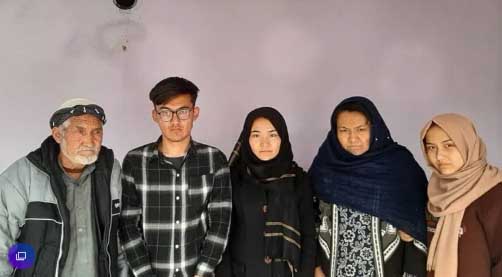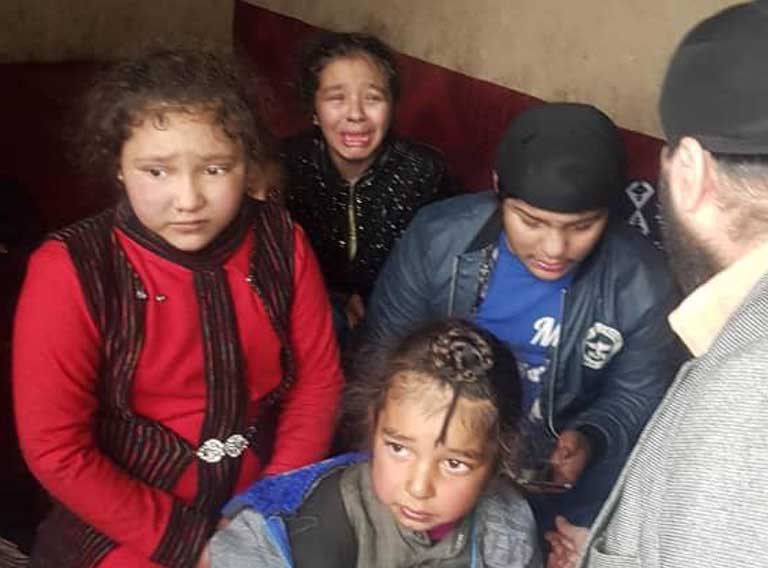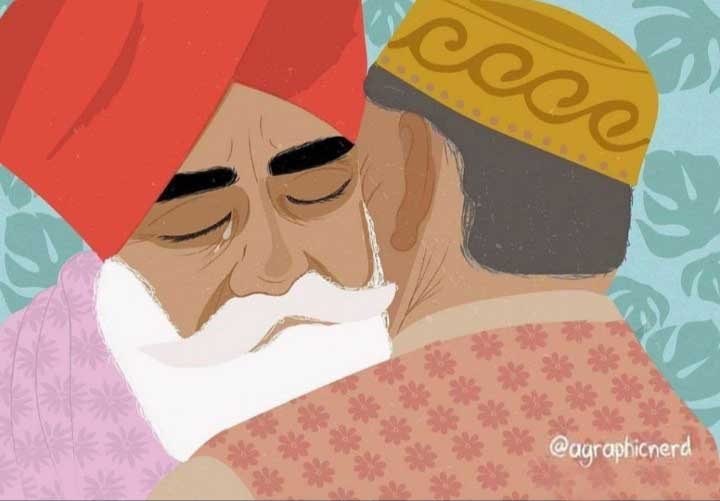A grateful Sikh nation will never forget Mahram Ali Shaghasi of Kabul
On the eve of the holy month of Ramzan, sharing his gratitude and empathy, editor of The World Sikh News and human rights activist Jagmohan Singh writes an Open Letter to Abdul Wahid -the son of Mahram Ali Shaghasi -the Muslim protector of the Gurdwara in Kabul, who was among the first to be killed on 25 March 2020. Campaigning for justice for Afghan Sikhs, the writer worries about the family of Mahram Ali Shaghasi -a true friend of the Sikhs who loved his presence in the Kabul Gurdwara. He pays humble homage to Mahram Ali Shaghasi and reiterates that bigots, tyrants and hate-mongers know no religion.
![On the eve of the holy month of Ramzan, sharing his gratitude and empathy, editor of The World Sikh News and human rights activist Jagmohan Singh writes an Open Letter to Abdul Wahid -the son of Mahram Ali Shaghasi -the Muslim protector of the Gurdwara in Kabul, who was among the first to be killed on 25 March 2020. Campaigning for justice for Afghan Sikhs, the writer worries about the family of Mahram Ali Shaghasi -a true friend of the […]](https://www.theworldsikhnews.com/wp-content/uploads/2020/04/afghan-muslim-360x266.jpg)
DEAR ABDUL WAHID SHAGHASI: Aadab! Four weeks ago, your devout Namazi father – Mahram Ali Shaghasi, died with the 25 Sikh men, women and a child, in the one-man gun attack by forces of division and hate, at Gurdwara Guru Har Rai in Kabul. I write this open letter to you to acknowledge that his death in the line of duty while protecting the precincts of a religious place of worship will be remembered by the Sikhs for all times to come.
When the history of the attack on 25 March 2020 is recorded, a grateful Sikh community will record the sacrifice of your father, who had a great bonding with the Afghan Sikh and Hindu communities.
I assure you that Sikh organisations who are dedicated to the protection and rehabilitation of Afghan Sikhs take care of your family. Sikh humanitarian bodies will reach out to offer respect, relief and rehabilitation for your family to start life afresh.

History is replete with the true-life stories of Sikh-Muslim religious and political affinity and gratitude of Sikhs towards every action of Muslims and Muslim society standing for truth and justice.
As quoted by Inderjeet Singh in his monumental book -Afghan Hindus and Sikhs -History of 1000 years -the Sikh residents of Afghanistan recall with awe and respect that in 1954 when the Nangahar provincial government wanted to modernise the road around the Guru Nanak Darbar in Jalalabad, the provincial authorities wanted to demolish the historic Gurdwara in Jalalabad and give an alternative place in lieu thereof. The then King of Afghanistan -Emperor Zahir Shah responding to the call of the Sikhs, issued a royal edict, overturning the provincial order.
The remainder of the Sikhs now in Kabul, Jalalabad and Gazni, though worried about their lives and historical Gurdwaras, still hopefully believe that if and when, each and every Sikh leaves the war-torn country, their religious places of worship will be safe and the country would do all it takes to protect them.

Although many are still in disrepair, the large-heartedness of the Muslims in Pakistan in keeping intact religious places and in many places even homes and hearths of Sikhs to this day, as being discovered on a daily basis by Facebook activist, historiographer and friend of Sikhs -Shahid Shabbir, is a tribute to the goodness in humankind demonstrated by the Muslims.
In equal measure, Sikhs in East Punjab have preserved masjids, mazhars and madrassas. Sikh activists have unequivocally stood rock-solid with Kashmiris and their cause.
Wahid, I truly say that when the photos of Afghan Sikhs killed in the ghastly tragedy of March 2020, adorn the walls of the Sikh National Museum in Amritsar or anywhere else in the world, I have no hesitation in saying that the photo of your father will also stand tall -frame to frame with the Sikhs.
When there was Jahangir, there was Mian Mir
When there was Aurangzeb, there was Buddhu Shah Fakir
Our True Emperor -the First Master Guru Nanak laid the foundations of an inclusive society, focussed God-wards, without discrimination by having a Muslim savant and bard Bhai Mardana as his life-long companion.
My revolutionary poet friend Gajinder Singh, has appropriately reminded the community in his unique style by telling us that,
When there was Jahangir, there was Mian Mir
When there was Aurangzeb, there was Buddhu Shah Fakir
It is unparalleled in the history of world religions, that the foundation stone of its holiest of holies is laid down by the leader-follower of another faith. Sain Mian Mir laid the foundations of Darbar Sahib -also known as the Golden Temple, at the behest of the Fifth Master Guru Arjan and added a unique chapter in the evolvement of Sikh history.
Buddhu Shah Fakir and his sons died fighting for the Khalsa and we remember them to this day.
Wahid, I truly say that when the photos of Afghan Sikhs killed in the ghastly tragedy of March 2020, adorn the walls of the Sikh National Museum in Amritsar or anywhere else in the world, I have no hesitation in saying that the photo of your father will also stand tall -frame to frame with the Sikhs.
Sher Mohammed Khan, -the Nawab of Malerkotla, in brute Wazir Khan’s open court at Sirhind, challenged the inhuman order to brick alive the sons of Guru Gobind Singh -Baba Fateh Singh and Baba Zorawar Singh, who refused to relinquish their faith and follow another. History stands testimony to the fact that when anger and angst took over the two communities in 1947, and men turned beasts in total denial of humanity taught by their religions, even then Sikhs did not turn a bad eye for Malerkotla Muslim residents. To this day, in gratitude, Malerkotla stands as an oasis of religious tolerance and multiculturalism in the Punjab.
I know that there are people in this world, including in my community, who are attempting a short-sighted parochial approach and trying to relate things in a silly and awkward way. You don’t have to worry. The collective wisdom of the Sikh community is that we are committed to pluralism and humanitarianism.
It is comforting to note that the Afghan government which has provided adequate security in Kabul, Jalalabad and Gazni.
Just a few months back, when a tiny minuscule minority of Sikh activists and farmers reached Jamia and Shaheen Bagh, during the anti-CAA protests in Delhi, the Sikh spirit was represented with full gusto, vigour, pain and empathy. Numbers didn’t matter.
The words of a young student activist at Jamia Milia University protest in Delhi, still ring in my ears, “I do not know what my father and grandfather did or did not do during the November 1984 anti-Sikh pogrom in Delhi, but God forbid, should Sikhs face any difficult time again in future in this heartless society of Delhi or anywhere in India, I and my other Muslim friends will be there shoulder to shoulder with the Sikhs.’
Many a Sikh intellectual, politician and social media warrior wanted to know whether any Muslim or Muslim organisation have condemned the Kabul tragedy. Obviously, blinded by their own venom, they did not read what the Jamia Teachers Association wrote, they could not hear the calls of condemnation by Maulvis in many cities, including in Punjab and they failed to notice the forthright denunciation by the Organisation of Islamic Countries.
“I do not know what my father and grandfather did or did not do during the November 1984 anti-Sikh pogrom in Delhi, but God forbid, should Sikhs face any difficult time again in future in this heartless society of Delhi or anywhere in India, I and my other Muslim friends will be there shoulder to shoulder with the Sikhs.’
The Sikhs in Kabul, living in dangerous territory and facing life and death challenges are nonetheless grateful for the warmth and love showered by the Afghan governmental officials who promptly visited the Gurdwara in Kabul soon after the tragedy to provide solace and succour. It is comforting to note that the Afghan government which has provided adequate security in Kabul, Jalalabad and Gazni.
Only those with an agenda in their hacked brains could have missed the days-on-end thousands of posts in Pashto by Afghans from all walks of life, condemning the killings without fear of reprisal and expressing love and affection towards the Sikhs, their simplicity, honesty and hardworking ethics.
 The sketch of Jamia student of civil services, poet and activist Munawwar Majrooh etched soon after the tragedy with the words, ‘Stand with Sikh brothers in this hour of distress,” applied balm on our wounds, reiterated solidarity which we cherish.
The sketch of Jamia student of civil services, poet and activist Munawwar Majrooh etched soon after the tragedy with the words, ‘Stand with Sikh brothers in this hour of distress,” applied balm on our wounds, reiterated solidarity which we cherish.
Even if any of the above had not happened, the Sikh position would have been the same. The Sikhs stand committed to express solidarity with the weak and oppressed. As taught by the Ninth Master Guru Tegh Bahadur, Sikhs are always in readiness to lay down their lives for the equality of rights, right to religion of one’s choice and human rights for all.
I will be failing in my gratitude if I do not thank Afghani Sikh Manpal Singh -the former employer of your father who whilst leaving Kabul a few years ago, honouring the honesty and diligence of your father, ensured that your father got a job and stay at the Gurdwara in Kabul. Then, he did not envisage that those opposed to humanity would even attack the sacred place of God.
The Sikh nation will go beyond the call of duty like your father Mahram Ali Shaghasi in applying marham-succour and piety to you and all your family members. Mahram Ali Shaghasi’s life will be another symbol of Sikh-Muslim affinity and brotherhood.
Please convey my Aadab to your 75-year-old grandfather Qurban Ali, your mother Fariba Gul Rok and your siblings Parwez, Murwarid and Geeta that the Sikhs remember you all. Tell them, Sikhs love and respect you for the deeds of your father and that you all will stay in our memories for all times to come.
Sincerely
Jagmohan Singh
Editor, The World Sikh News

7 thoughts on “A grateful Sikh nation will never forget Mahram Ali Shaghasi of Kabul”